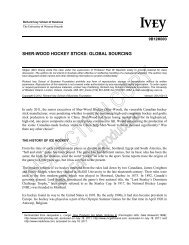foundation of canada asia pacific - Content Tagged with
foundation of canada asia pacific - Content Tagged with
foundation of canada asia pacific - Content Tagged with
Create successful ePaper yourself
Turn your PDF publications into a flip-book with our unique Google optimized e-Paper software.
ASIAN EXPERTISE<br />
5<br />
hidden advantage<br />
or lost opportunity?<br />
53<br />
Globalization is more than the liberalized flow <strong>of</strong> goods and capital across borders, or the<br />
dispersal <strong>of</strong> various parts <strong>of</strong> a production chain across different countries. Globalization<br />
has opened the doors to the freer movement from country to country <strong>of</strong> workers <strong>of</strong> all<br />
descriptions, from labourers and domestic staff to skilled pr<strong>of</strong>essionals and technicians.<br />
Canadians, as much as most people, are aware <strong>of</strong> this because <strong>of</strong> the public debate about<br />
the so-called “brain drain” <strong>of</strong> our own doctors, engineers and computer experts to the<br />
United States. Canadian business is hard pressed to find ways to attract and hold the<br />
staff it needs in the face <strong>of</strong> stiff competition from US firms able to bid for many types <strong>of</strong><br />
skilled Canadian workers under the terms <strong>of</strong> the North American Free Trade Agreement.<br />
Globalization opens the door out as well as the door in.<br />
The situation facing staff <strong>with</strong> expertise in Asian trade and investment is quite different.<br />
Rather than finding Canadian employers eagerly bidding to keep their services, they<br />
must <strong>of</strong>ten look to foreign companies for jobs. Canadian business, it seems, is losing<br />
Canadian-developed expertise in Asian business practices by default. In Asia, this is<br />
because there are so few Canadian companies to employ them. In Canada, it is because<br />
<strong>of</strong> a widespread lack <strong>of</strong> appreciation <strong>of</strong> the need for specialized cultural and business skills<br />
in approaching Asian markets, or simply an unwillingness to see international experience<br />
as a job asset. Some companies that do understand the unique business hurdles in Asia are<br />
now looking for the expertise in the wrong place, by turning to young Asian Canadians<br />
who <strong>of</strong>ten have no Asian expertise other than a language skill. This has the double<br />
impact <strong>of</strong> ignoring trained Asian expertise while pigeonholing some Asian-Canadian<br />
graduates into positions for which they feel unqualified.<br />
Over the past decade, a number <strong>of</strong> Canadian universities and colleges have developed<br />
business programs aimed at producing graduates <strong>with</strong> specific knowledge <strong>of</strong> Asia-Pacific<br />
markets and business practices. McGill University in Quebec, York University and Humber<br />
College in Ontario, Capilano College in British Columbia and Grant McEwan Community<br />
College in Alberta all have programs <strong>with</strong> an Asia-Pacific focus, and together they turn<br />
out more than 100 graduates a year. In many cases, the graduates also acquire competence<br />
in one <strong>of</strong> the major Asian languages. Some <strong>of</strong> the programs <strong>of</strong>fer students the opportunity<br />
<strong>of</strong> working in an Asian country. Other graduates spend time in Asia under the federal



